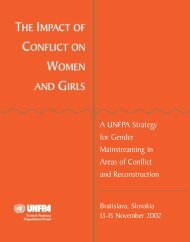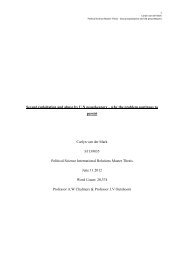Stop Sudah English-revised-March2012 - International Center for ...
Stop Sudah English-revised-March2012 - International Center for ...
Stop Sudah English-revised-March2012 - International Center for ...
You also want an ePaper? Increase the reach of your titles
YUMPU automatically turns print PDFs into web optimized ePapers that Google loves.
odies sank. 44<br />
Bloody Biak, 1998<br />
In early July 1998, a group of people raised the Morning Star flag on top of the water tower near the city of<br />
Biak’s port. Many citizens gathered, prayed, and sang church hymns from July 2–5. On July 6 th , residents<br />
who had gathered were attacked by a joint military and police (Mobile Brigade) <strong>for</strong>ce. The Documentation<br />
Team noted the experiences of several women who were in Biak at that time.<br />
We heard the sound of gunfire and screaming . . . “Get out! Out of the house!” . . . Joint security <strong>for</strong>ces were walking<br />
and . . . shooting in the air . . . A soldier held a gun on me and ordered me to walk to the harbor . . . [By] the side<br />
of the water tower I . . . saw the masses . . . holding hands and circling around the tower. They were singing a hymn.<br />
[Suddenly] a shot was heard . . . the people scattered . . . I saw a woman shot . . . in the leg . . . [After being<br />
detained at the port], we went home, passing by . . . the water tower . . . There was a mobile water tank . . .<br />
spraying the blood at the foot of the water tower. The mobile tank was also spraying away blood that was on top of<br />
the tent that the masses had brought earlier to sit under while at the water tower. 45<br />
At about 5:30 in the morning the joint military/police <strong>for</strong>ce attacked . . . At that time, I [one of the women<br />
victims] and others were still under the tower. We were shot at with real bullets . . . I took my Bible . . . kept<br />
running and hid with five men in a toilet, but then we were ambushed by Mobile Brigade troops . . . we were herded<br />
by a soldier to the seaport. He beat me with bougainvillea flower branches [these have large, sharp thorns] and<br />
continued to drag me like an animal. At the port . . . there was a police officer dressed like a thug who said, “Ask<br />
your God <strong>for</strong> help. Later your Gold will come help you.” Then they beat me again. I was detained at the port from<br />
8.00 am until 5.00 pm be<strong>for</strong>e I was released. 46<br />
1.2. State Violence: 1999–2009<br />
The Documentation Team began the process of collecting testimonies of women victims of state violence<br />
with a question, “Did this violent situation improve with the re<strong>for</strong>m era that led to Special Autonomy?”<br />
Results showed that hopes <strong>for</strong> improvement changed to disappointment given the fact that the government<br />
still used a security approach as the main way to deal with public discontent. Furthermore, during this<br />
period several violent incidents surfaced, such as cases that, according to the National Human Rights<br />
Commission (Komnas HAM), indicate crimes against humanity, such as Abepura, Wasior, and other cases.<br />
Arbitrary behavior and discrimination of security <strong>for</strong>ces against persons who are considered separatists also<br />
have an impact on various <strong>for</strong>ms of violence against women, including sexual violence.<br />
Timika, 1999<br />
In the early days of re<strong>for</strong>m, exactly on December 1, 1999, the people of Timika raised the Morning Star flag<br />
in the yard of the Three Kings Catholic Church. A month later, on January 2, the Mobile Brigade and army<br />
<strong>for</strong>cibly lowered the flag, while shooting at the people in the churchyard. Four women were among the<br />
victims—one was hit so hard her hand broke and her opposite leg was shot and eventually amputated,<br />
another one was beaten, the others died from gunshot wounds.<br />
One of the four victims had gone to Timika to get aid such as used clothing and money from her sister. She<br />
thought she would go <strong>for</strong> just awhile and then return home. While in Timika she heard that the Morning<br />
44 MIM14 and MIM15 cases as told by a witness.<br />
45 BIA09 narrative.<br />
46 BIA08 narrative, combination of two sets of field notes.<br />
ENOUGH IS ENOUGH! 26




![IANSA [PDF, 2MB] - PeaceWomen](https://img.yumpu.com/25206379/1/190x123/iansa-pdf-2mb-peacewomen.jpg?quality=85)
![Commitments Sample [PDF, 93KB] - PeaceWomen](https://img.yumpu.com/25206331/1/190x245/commitments-sample-pdf-93kb-peacewomen.jpg?quality=85)










![A Toolkit for Advocacy and Action [PDF, 260KB] - Peace Women](https://img.yumpu.com/25205989/1/190x245/a-toolkit-for-advocacy-and-action-pdf-260kb-peace-women.jpg?quality=85)